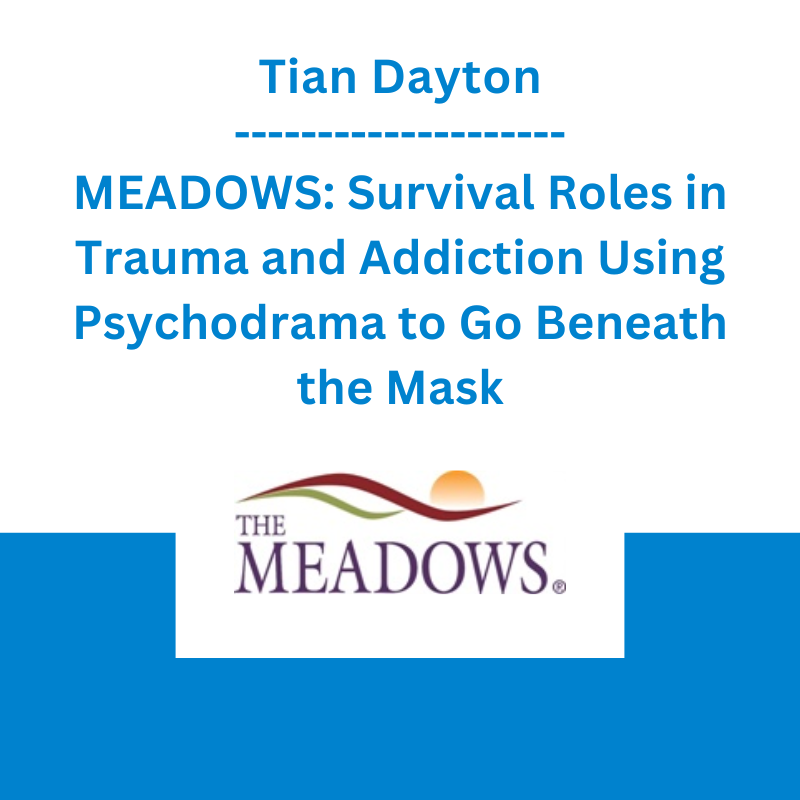*** Proof of Product ***
Exploring the Essential Features of “Tian Dayton – MEADOWS: Survival Roles in Trauma and Addiction Using Psychodrama to Go Beneath the Mask”
Speaker: Tian Dayton, PhD
Duration: 1 Hour 31 Minutes
Copyright: Dec 10, 2020
Media Type: Digital Seminar
Description
In this role play, Dr. Dayton demonstrates the use of clinical use of psychodrama and the “empty chair”. Through film clips and theoretical descriptions, she takes the viewer through warm-up, action and closure phases of empty chair work deconstructing the theoretical underpinnings as she goes. Dion reveals the kind of emotional conflict that he self-medicated and further refines his narrative. We see as the “protagonist/client” explores, through assisted role play, the meaning and purpose of a “defensive” or “survival” role that has served him to date but is now getting in his way. He is able through role play and role reversal, to gain a deeper understanding of why the role was constricted in the first place, what parts of the role still serve him well and what parts he wants to release. Included is a nine- month follow-up session with Dion exploring the effect of the drama over time and the life changes he’s made.
Tian Dayton, PhD
Tian Dayton, PhD, is a Senior Fellow at The Meadows and a nationally renowned speaker, expert, and consultant in trauma, addiction, and psychodrama. Her work has been praised by many of today’s leading voices in psychotherapy including Peter Levine and Stephen Porges.
Dr. Dayton is the director of The New York Psychodrama Training Institute and author of 15 books including the soon to be released Treating Adult Children of Relational Trauma (PESI Publishing, 2023).
A board-certified trainer in psychodrama, sociometry and group psychotherapy, she’s spent her decades long career adapting psychodrama and sociometry for work specifically with relational trauma and addictions. Her trademarked processes Socio Metrics, are in use nationally and around the world, as is her model Relational Trauma at NYU for eight years, and has appeared a guest expert on NBC, CNN, MSNBC and other major media outlets. She has received many awards for her work including the Lifetime Achievement Award from the American Society of Psychodrama, Sociometery and Group Psychotherapy.
Speaker Disclosures:
Financial: Dr. Tian Dayton is a senior fellow at the Meadows and has employment relationships with Newport Academy and the New York Psychodrama Training Institute. She receives compensation as a consultant and receives royalties as a published author. Dr. Dayton receives a speaking honorarium and recording royalties from Psychotherapy Networker and PESI, Inc. She has no relevant financial relationships with ineligible organizations.
Non-financial: Dr. Tian Dayton is a fellow of the American Society of Psychodrama, Sociometry and Group Psychotherapy. She is a blog writer for Counselor Magazine, Recovery View and The Huffington Post, Thrive Global, and Meadows Media.
Outline
The Use of Psychodrama in Treating Relational Trauma
- The techniques that allow empty chair work to flow safely as it explores layers of personal and interpersonal truth.
- Demonstration of how psychodrama is an embodied form of therapy and how it allows psychic material that has been frozen in the body/mind to safely surface and be elevated into consciousness through words and simple, natural actions.
Deconstruction of the “how to’s” of a Basic Psychodramatic Role Play (within a broader theoretical framework).
- “Words cannot reach the part of the brain that has been traumatized,” Bessel van der Kolk.
- How in psychodrama we talk “to” rather than “about” a person/interaction.
- Bypassing the problem in trauma work of creating a false narrative, or borrowing other people’s meaning.
- The client erroneous attempts to describe unconscious material before s/he has yet to bring the reexperiencing to consciousness enough to make accurate personal meaning of it.
The Internalization of Introjects
- Within the individual psyche and played out in relational reenactments.
- Shows how a defensive role becomes established to protect an individual from pain and perceived emotional assault.
Objectives
- Determine the skills of psychodrama/role play as they can be used in one-to-one therapy.
- Demonstrate how to work with relational trauma and addiction using the techniques of psychodrama.
- Evaluate why psychodrama’s unique ability to incorporate body, motion and words allows for an integrated and spontaneous encounter with the self that no other method provides.
Please see the full list of alternative group-buy courses available here: https://lunacourse.com/shop/










 Dave Landry - Stock Selection Course
Dave Landry - Stock Selection Course